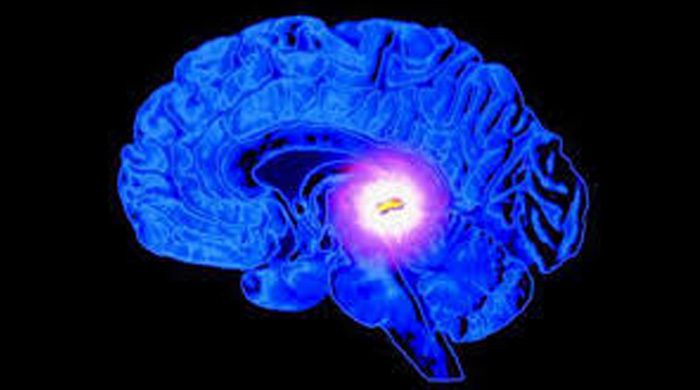Fluoride And The Pineal Gland

The pineal gland is an endocrine gland that secretes hormones into bloodstream. The pineal gland resembles a small pine cone and is located between the right and left hemispheres of the brain. It produces the hormone melatonin which influences the circadian rhythm (sleep patterns). Melatonin also helps control the timing and release of female reproductive hormones, and is an antioxidant that protects the body from cell damage and aging caused by free radicals.[1]
Though the pineal gland resides in between the brain, it is not protected by the blood brain barrier that protects the brain.[2] Fluoride doesn’t accumulate in the brain and the brain has the lowest concentration of fluoride of all the tissues in the body.[3] The brain blood barrier restricts fluoride from entering the right and left hemispheres of the brain and nervous system. Blood flow enters the pineal gland virtually unfiltered, which allows fluoride to accumulate in high concentrations in the pineal gland.
Parts of the pineal gland become calcified with hydroxylapatite (HA) crystallites. The high concentration of fluoride in the pineal gland stems from this calcification. The high concentration of fluoride in the pineal gland is likely due to the large surface area of the HA crystallites that attract fluoride. The HA crystallites in the pineal gland have the highest concentrations of fluoride in the body ranging from 9000 – 12000ppm, which is on par and even higher than fluoride levels in the bones of people with skeletal fluorosis.[4]
The high calcification and fluoridation of the pineal gland is concerning because of its disruption of the pineal gland functions. The National Research Council released a report indicating “fluoride is likely to cause decreased melatonin production and to have other effects on normal pineal function, which in turn could contribute to a variety of effects in humans.”[5]
[1] Melatonin: University of Maryland Medical Center
[2] Brain Barrier and Cerebral Metabolism
[3] Fluoride Deposition in the Aged Human Pineal Gland Jennifer Luke
[4] The Effect of Fluoride on the Physiology of the Pineal Gland
[5] Fluoride in Drinking Water: A Scientific Review of EPA’s Standards (2006)
More Fluoride Information:
- Tamarind Fluoride Detox
- Link Between Fluoride And The Calcification Of The Pineal Gland
- What Is The Role Of Fluoride In The Body?
- Iodine Removes Fluoride From The Body And Serves As A Fluoride Detox
- Boron Fluoride Detox To Combat Skeletal Fluorosis And Decalcify The Pineal Gland






